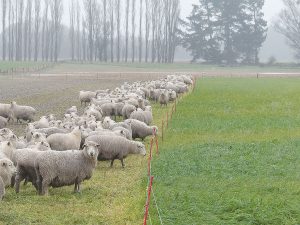Dairy power
OPINION: The good times felt across the dairy sector weren't lost at last week's Beef + Lamb NZ annual meeting.
 The ‘Understanding the impacts of sheep winter grazing’ project looked at grazing practices and the impact these had on contaminant losses.
The ‘Understanding the impacts of sheep winter grazing’ project looked at grazing practices and the impact these had on contaminant losses.
The value of protecting critical source areas in intensively grazed winter forage crops has been highlighted in a sheep winter grazing trial carried out on an Otago farm.
Run by AgResearch and supported by industry stakeholders – including Beef + Lamb New Zealand, the Ministry for Primary Industries and the NZ Landcare Trust – the ‘Understanding the impacts of sheep winter grazing’ project looked at grazing practices and the impact these had on contaminant losses.
The researchers found that where critical source areas (CSAs) were left ungrazed, there were significantly fewer contaminant issues than when these were cropped and grazed.
Water sampling also showed a reduction of approximately half in the amount of phosphorus sediment and E.coli in overland water flows – compared to control areas where the critical source areas were grazed.
The paddocks where the trial was run over three winters between 2020- 2022 and covered two very similar catchments.
CSAs were identified and in-field measuring equipment was installed before forage crops, namely swede and kale, were planted and grazed. Good wintering management practices – including leaving CSAs in grass and ungrazed, directional grazing and back fencing – were implemented in the catchments over different years and compared to the catchments with no protection of the critical source areas.
Samples were captured during run-off events over each winter and spring period.
The findings of the study reinforced the value of leaving CSAs in grass and ungrazed. It also found that grazing and treading pressures on the soil were low compared to cattle grazing, and this allowed rainfall to infiltrate the soil.
Nicole Foote, NZ Landcare Trust’s regional coordinator for Otago, says this is the first-time data specific to the impact of sheep winter grazing had been collected.
She says while winter grazing is known to make a significant contribution to total losses of contaminants transported from land to water, there had been very little information available that documents losses under sheep grazing.
“This research provides invaluable information for farmers looking to improve their land management practices and minimise environmental risk.”
Legal controls on the movement of fruits and vegetables are now in place in Auckland’s Mt Roskill suburb, says Biosecurity New Zealand Commissioner North Mike Inglis.
Arable growers worried that some weeds in their crops may have developed herbicide resistance can now get the suspected plants tested for free.
Fruit growers and exporters are worried following the discovery of a male Queensland fruit fly in Auckland this week.
Dairy prices have jumped in the overnight Global Dairy Trade (GDT) auction, breaking a five-month negative streak.
Alliance Group chief executive Willie Wiese is leaving the company after three years in the role.
A booklet produced in 2025 by the Rotoiti 15 trust, Department of Conservation and Scion – now part of the Bioeconomy Science Institute – aims to help people identify insect pests and diseases.